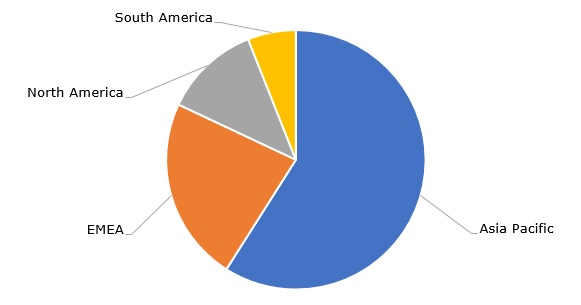Ethylbenzene is an aromatic hydrocarbon used predominantly in the co-production of styrene, which is indispensable in the manufacturing of polystyrene and a myriad of other polymers. As such, the market for ethylbenzene closely follows that of styrene. Various vertically integrated producers with both ethylbenzene- and styrene-manufacturing units consume their ethylbenzene internally for their in-house styrene production. This significantly reduces export-import volumes of merchant ethylbenzene traded internationally, while leading ethylbenzene-exporting countries are disassociated with major ethylbenzene-producing ones. Niche applications of ethylbenzene include the production of pesticides, inks, solvents, fuels, asphalt, naphtha, paints, synthetic rubber, and other commodities. Ethylbenzene is traditionally produced by the alkylation of benzene with ethylene in the presence of a catalyst.
The market for ethylbenzene is currently driven by such factors as high petroleum prices, rising energy costs, robust demand for various end-products (incl. consumer packaging, oxyfuels, automotive polymers, and construction materials), disrupted logistics, limited supply (partially exacerbated by planned summertime maintenance turnarounds at major refineries), and global political instability. As of 2022, the total ethylbenzene production capacity worldwide exceeds 45 million tonnes per year with a steady annual growth rate of about 4-5%. Asia and EMEA are key ethylbenzene-consuming regions.
Ethylbenzene: structure of the global consumption by region

Rising feedstock prices, alongside with high demand for petroleum hydrocarbons and their derivatives, safeguarded substantial profit margins for key ethylbenzene manufacturers in Q1 2022, and this trend is likely to persevere in the nearest future. Main ethylbenzene manufacturers, like LyondellBasell, reported excellent financial performance within this period despite multiple before-alluded challenges. Apart from strong financial performance, ethylbenzene producers have been paying significant attention to the issues of sustainable logistics, decarbonization, circular economy, energy saving, and the use of renewables. These sustainable themes start to play a quintessential role in the activities of such ethylbenzene-manufacturing chemical companies as Chevron Phillips, Ineos, Synthos, and Versalis (Eni). This trend is likely to have a more pronounced and all-encompassing character in the future.
Find a detailed analysis of the global ethylbenzene market in the in-demand research report “Ethylbenzene (EB): 2022 World Market Outlook and Forecast up to 2031”.
